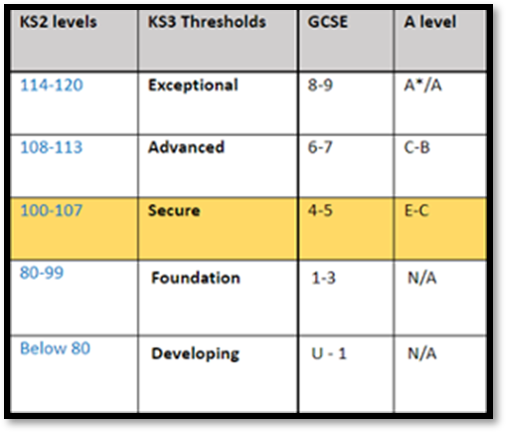Assessment
ACADEMIC REPORT INFORMATION
What are the thresholds?
- Exceptional – This student has accessed, understood and retained almost all of the knowledge and skills delivered in this phase of the curriculum.
- Advanced - This student has accessed, understood and retained the majority of the knowledge and skills delivered in this phase of the curriculum.
- Secure - This student has accessed, understood and retained a sufficient amount of the knowledge and skills delivered in this phase of the curriculum.
- Foundation - This student has accessed, understood and retained a basic amount of the knowledge and skills delivered in this phase of the curriculum.
- Developing - This student has accessed, understood or retained a limited amount of the knowledge and skills delivered in this phase of the curriculum.
How are the baseline thresholds calculated?
The baseline threshold is generated from your child’s KS2 results and is based on how previous students, with the same attainment on entry, have achieved in in their subjects. This table explains how the KS3 thresholds link to KS2, KS4 and KS5:

The target threshold is the threshold above their baseline threshold. Of course, it is possible that a student will achieve above their target threshold, as this is based purely on attainment on entry, and is not subject to any modification regarding effort, absence or individual talent in a particular subject.
How do I know if my child is making good progress?
The colour of the grade tells you how well your child has progressed so far in that particular subject, showing if they are on target to achieve the highest grade they could be expected to achieve.

If the progress is below the level expected, then the teacher may have given an underachievement concern as a reason for that lack of progress. Your child’s teacher may contact you directly to discuss this and to inform you of any strategies which will be employed to help your child to make the progress expected. A table describing the underachievement concerns is given below.

Effort grades are explained in the table below.
Effort is the way we assess and monitor students’ approach to their studies. The descriptors are used by each teacher to assess students’ effort in their classes, and this effort is reported home three times a year. We place a great deal of emphasis on effort towards learning.
Your child has the power to shape their effort in learning. The actions associated with showing "Exceptional" and "Good" effort are within every student's reach, irrespective of their learning preference, grades, or favourite subjects.
Regardless of the challenges students face or their academic standing, your child can actively choose to display enthusiasm and strong commitment in their studies.
By consistently making these positive choices, students set themselves on a path to achieve exceptional progress in their educational journey.
|
ETL |
A - Exceptional Effort |
B - Good Effort |
C - Inconsistent Effort |
D - Unacceptable Effort |
|
A highly motivated and self-disciplined student who always completes work to his/her best ability. |
A committed student who is determined to achieve and who completes work to a standard that reflects his/her ability. |
A student who is sometimes unprepared, who generally acts with politeness and consideration, but can behave inappropriately causing the disruption of learning. |
A student whose attitude to learning is not yet at the expected level for a student at Mossbourne Fobbing Academy. |
Key features
- Students are ranked according to their Effort Towards Learning. Academic performance does not contribute to student scores. These scores are turned into an overall average.
- Students engage with the matrices so they understand what we mean by exceptional Effort Towards Learning.
- Students are not in competition with each other; they are ranked against fixed thresholds. However, some students may enjoy the competitive element.
- Data is collected three times a year and reported to parents in December, April, and July.
- Rewards/support strategies are launched immediately after the data is collected.
- Rewards/support strategies are consistent so staff understand their roles, and students know what to expect if they improve or slip down the rankings.

